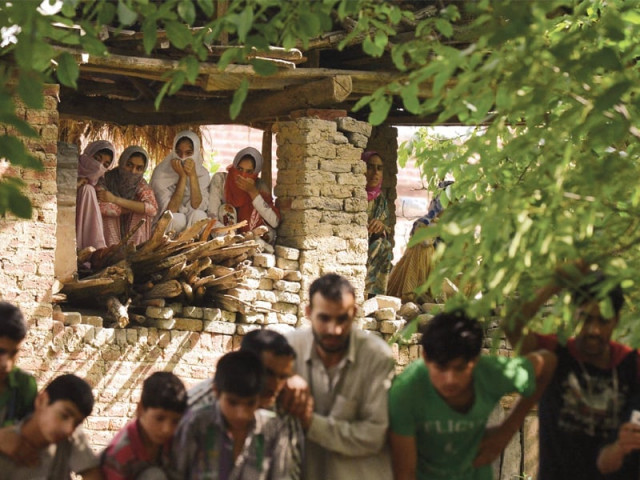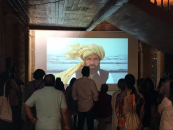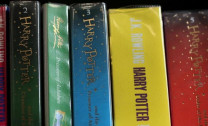Poetry: Write or Retreat
Young people fight a different battle in Indian-administered Kashmir with the help of smaller, powerful ammunition.

Kashmiri Muslim villagers mourn as the body of Kashmiri rebel Shahnawaz Ahmed alias Tahir Khan,of Hizbul Mujahideen is carried by during a funeral ceremony at Tral, some 40kms south of Srinagar on July 2, 2013. Indian troops shot dead three rebels while one special operation group (SOG) soldier died and five were injured in a firefight with militants in the restive Himalayan state. About a dozen armed groups have been fighting Indian forces since 1989 for Kashmir’s independence or for its merger with Pakistan. PHOTO: AFP
Wani is the face of a growing number of young Kashmiris who have struggled to find a less violent but just as effective way to fight their battles in the Indian-administered territory or process their pain.
Wani was a 13 year old living in Baramulla district in 2009 when a second mass uprising gripped the valley. He would spend most of his time alone in his room, watching at a tortured distance young men who looked like him pour into the streets. They hurled stones at the Indian security forces and were battered in return. Nearly 100 people were left dead in 2010. The Indian security forces responded savagely, still acting under the authority of the controversial Armed Forces Special Powers Act that was introduced 20 years earlier to end the first, 1989 uprising. Wani’s room filled with the anti-India slogans. His head became an echo chamber.

He began writing the novel while he was studying literature at Aligarh Muslim University. It tells the story of Sahil, a teenage boy, who lives with his half-widow mother, grandfather and a younger sister in the conflict zone. Wani shows his protagonist struggling to give meaning to his existence during the uprisings that ran from 2008 to 2010.
Wani thus got the shouting out of his head and on to the page: wailing widows, waiting half-widows, disappeared sons... “In a conflict zone, [the] youth register their protest through different methods... street protest, seminars, debates, songs or literature,” he says. “My medium is writing.”
As someone once famously theorised, novels write nations. Wani’s emotional narrative is likely to thus resonate with many Kashmiris. He has, in particular, tried to show how relationships are shaped and altered during such turbulent times. But more importantly, Wani’s exposition of the difference between a ‘martyr’ and a ‘benefactor’ will articulate important phenomena emerging from this long-running conflict. Those who died during the fighting are ‘martyrs’ and those who live and fight for the cause of freedom are ‘benefactors’.
“Why some people take to guns and stones while others choose writing, is because of the difference in their thinking,” he says. If you’re angry and full of rage you’ll pick up a stone and if you’re sober and patient, then you’ll pick up a pen.

The Graveyard was published by Power Publishers in Kolkata this June, and was scheduled for release on July 8 at Central University, Kashmir. It places Wani as the youngest novelist in Kashmir.
Many other young people are also writing, even if they are not necessarily interested in it as a profession. In her unpublished poem Razor wire, 21-year-old Areeba Nazir describes about how it twirls and twists in her “forgotten heaven”, line Dal lake, and the foothills of Zabarwan, row the gates of Nishat and Harwan.
“The situation in which I [was] brought up has urged me to write such poems,” she says. While she builds her portfolio she continues to contribute occasionally to newspapers in Kashmir.
These young writers come from a rich literary heritage. Baba Umar, a Doha-based journalist and a native of Kashmir, traces writing as a form of resistance to Dogra rule in the valley. He gives the example of legendary poet Peerzada Ghulam Ahmad ‘Mahjoor’ (1885-1952) who railed against the rulers. His work Bidad (The Complaint) gave rise to “one of the most popular slogans of anti-India brigade in Kashmir”, as Haroon Mirani reports in an article for the website Kashmir Newz on July 3 this year.
“[The] Kashmiri youth [were] mostly faced [with] questions [about] their history, identity and roots,” Umar says. This was a reaction to the “blinkered approach” used by colonial writers or pandits. According to Umar, also a recipient of the International Committee of Red Cross best humanitarian reporting award, this reinforced the need to “have local narrative[s], propounded and propagated by Kashmiri ‘warrior’ writers.”
This led many Kashmiris to write blogs, contribute to newspapers and magazines and write poems to inform the world about their experience. Blogs are most easily accessible. ‘Kashmir Truth to be Told’, maintained by Yousuf, is packed with hundreds of posts on Kashmir that date to 2006. Most of the posts here are stories of suffering. Other blogs such as ‘Kashmir’ are an ode to their homeland. On it blogger K writes, “The only knocks we heard were of the military or the militants. The only parades we witnessed were the military identification parades. The dreams we dreamt were shattered by the sound of bullets. The games we played were of death and life.”
Much of the events that have unfolded there are detailed in the news but fiction provides a much different perspective. “The pain of killings, torture, rapes and other human right violations have been strong enough to urge the youth to write,” says the president of the Media Federation of India, Kashmir Chapter, Shabir Hussain. “The wide coverage of our conflict has [awoken] Kashmiris to write their own narratives, rather than someone else writing for them.”
Towfeeq Wani and The Graveyard which is available online at: Thevoxkashmir.com
Published in The Express Tribune, Sunday Magazine, July 14th, 2013.
Like Express Tribune Magazine on Facebook, follow @ETribuneMag on Twitter to stay informed and join the conversation.



















COMMENTS
Comments are moderated and generally will be posted if they are on-topic and not abusive.
For more information, please see our Comments FAQ